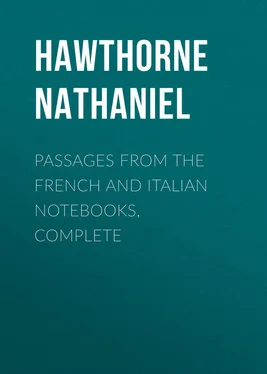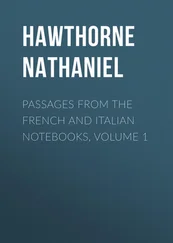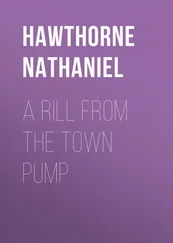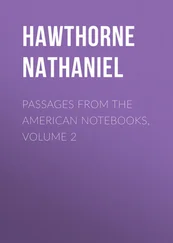Nathaniel Hawthorne - Passages from the French and Italian Notebooks, Complete
Здесь есть возможность читать онлайн «Nathaniel Hawthorne - Passages from the French and Italian Notebooks, Complete» — ознакомительный отрывок электронной книги совершенно бесплатно, а после прочтения отрывка купить полную версию. В некоторых случаях можно слушать аудио, скачать через торрент в формате fb2 и присутствует краткое содержание. Жанр: literature_19, foreign_antique, foreign_prose, на английском языке. Описание произведения, (предисловие) а так же отзывы посетителей доступны на портале библиотеки ЛибКат.
- Название:Passages from the French and Italian Notebooks, Complete
- Автор:
- Жанр:
- Год:неизвестен
- ISBN:нет данных
- Рейтинг книги:5 / 5. Голосов: 1
-
Избранное:Добавить в избранное
- Отзывы:
-
Ваша оценка:
- 100
- 1
- 2
- 3
- 4
- 5
Passages from the French and Italian Notebooks, Complete: краткое содержание, описание и аннотация
Предлагаем к чтению аннотацию, описание, краткое содержание или предисловие (зависит от того, что написал сам автор книги «Passages from the French and Italian Notebooks, Complete»). Если вы не нашли необходимую информацию о книге — напишите в комментариях, мы постараемся отыскать её.
Passages from the French and Italian Notebooks, Complete — читать онлайн ознакомительный отрывок
Ниже представлен текст книги, разбитый по страницам. Система сохранения места последней прочитанной страницы, позволяет с удобством читать онлайн бесплатно книгу «Passages from the French and Italian Notebooks, Complete», без необходимости каждый раз заново искать на чём Вы остановились. Поставьте закладку, и сможете в любой момент перейти на страницу, на которой закончили чтение.
Интервал:
Закладка:
Nathaniel Hawthorne
Passages from the French and Italian Notebooks, Complete
VOL. I
PASSAGES FROM HAWTHORNE'S NOTE-BOOKS IN FRANCE AND ITALY
FRANCE
Hotel de Louvre, January 6th, 1858. – On Tuesday morning, our dozen trunks and half-dozen carpet-bags being already packed and labelled, we began to prepare for our journey two or three hours before light. Two cabs were at the door by half past six, and at seven we set out for the London Bridge station, while it was still dark and bitterly cold. There were already many people in the streets, growing more numerous as we drove city-ward; and, in Newgate Street, there was such a number of market-carts, that we almost came to a dead lock with some of them. At the station we found several persons who were apparently going in the same train with us, sitting round the fire of the waiting-room. Since I came to England there has hardly been a morning when I should have less willingly bestirred myself before daylight; so sharp and inclement was the atmosphere. We started at half past eight, having taken through tickets to Paris by way of Folkestone and Boulogne. A foot-warmer (a long, flat tin utensil, full of hot water) was put into the carriage just before we started; but it did not make us more than half comfortable, and the frost soon began to cloud the windows, and shut out the prospect, so that we could only glance at the green fields – immortally green, whatever winter can do against them – and at, here and there, a stream or pool with the ice forming on its borders. It was the first cold weather of a very mild season. The snow began to fall in scattered and almost invisible flakes; and it seemed as if we had stayed our English welcome out, and were to find nothing genial and hospitable there any more.
At Folkestone, we were deposited at a railway station close upon a shingly beach, on which the sea broke in foam, and which J – reported as strewn with shells and star-fish; behind was the town, with an old church in the midst; and, close, at hand, the pier, where lay the steamer in which we were to embark. But the air was so wintry, that I had no heart to explore the town, or pick up shells with J – on the beach; so we kept within doors during the two hours of our stay, now and then looking out of the windows at a fishing-boat or two, as they pitched and rolled with an ugly and irregular motion, such as the British Channel generally communicates to the craft that navigate it.
At about one o'clock we went on board, and were soon under steam, at a rate that quickly showed a long line of the white cliffs of Albion behind us. It is a very dusky white, by the by, and the cliffs themselves do not seem, at a distance, to be of imposing height, and have too even an outline to be picturesque.
As we increased our distance from England, the French coast came more and more distinctly in sight, with a low, wavy outline, not very well worth looking at, except because it was the coast of France. Indeed, I looked at it but little; for the wind was bleak and boisterous, and I went down into the cabin, where I found the fire very comfortable, and several people were stretched on sofas in a state of placid wretchedness… I have never suffered from sea-sickness, but had been somewhat apprehensive of this rough strait between England and France, which seems to have more potency over people's stomachs than ten times the extent of sea in other quarters. Our passage was of two hours, at the end of which we landed on French soil, and found ourselves immediately in the clutches of the custom-house officers, who, however, merely made a momentary examination of my passport, and allowed us to pass without opening even one of our carpet-bags. The great bulk of our luggage had been registered through to Paris, for examination after our arrival there.
We left Boulogne in about an hour after our arrival, when it was already a darkening twilight. The weather had grown colder than ever, since our arrival in sunny France, and the night was now setting in, wickedly black and dreary. The frost hardened upon the carriage windows in such thickness that I could scarcely scratch a peep-hole through it; but, from such glimpses as I could catch, the aspect of the country seemed pretty much to resemble the December aspect of my dear native land, – broad, bare, brown fields, with streaks of snow at the foot of ridges, and along fences, or in the furrows of ploughed soil. There was ice wherever there happened to be water to form it.
We had feet-warmers in the carriage, but the cold crept in nevertheless; and I do not remember hardly in my life a more disagreeable short journey than this, my first advance into French territory. My impression of France will always be that it is an Arctic region. At any season of the year, the tract over which we passed yesterday must be an uninteresting one as regards its natural features; and the only adornment, as far as I could observe, which art has given it, consists in straight rows of very stiff-looking and slender-stemmed trees. In the dusk they resembled poplar-trees.
Weary and frost-bitten, – morally, if not physically, – we reached Amiens in three or four hours, and here I underwent much annoyance from the French railway officials and attendants, who, I believe, did not mean to incommode me, but rather to forward my purposes as far as they well could. If they would speak slowly and distinctly I might understand them well enough, being perfectly familiar with the written language, and knowing the principles of its pronunciation; but, in their customary rapid utterance, it sounds like a string of mere gabble. When left to myself, therefore, I got into great difficulties… It gives a taciturn personage like myself a new conception as to the value of speech, even to him, when he finds himself unable either to speak or understand.
Finally, being advised on all hands to go to the Hotel du Rhin, we were carried thither in an omnibus, rattling over a rough pavement, through an invisible and frozen town; and, on our arrival, were ushered into a handsome salon, as chill as a tomb. They made a little bit of a wood-fire for us in a low and deep chimney-hole, which let a hundred times more heat escape up the flue than it sent into the room.
In the morning we sallied forth to see the cathedral.
The aspect of the old French town was very different from anything English; whiter, infinitely cleaner; higher and narrower houses, the entrance to most of which seeming to be through a great gateway, affording admission into a central court-yard; a public square, with a statue in the middle, and another statue in a neighboring street. We met priests in three-cornered hats, long frock-coats, and knee-breeches; also soldiers and gendarmes, and peasants and children, clattering over the pavements in wooden shoes.
It makes a great impression of outlandishness to see the signs over the shop doors in a foreign tongue. If the cold had not been such as to dull my sense of novelty, and make all my perceptions torpid, I should have taken in a set of new impressions, and enjoyed them very much. As it was, I cared little for what I saw, but yet had life enough left to enjoy the cathedral of Amiens, which has many features unlike those of English cathedrals.
It stands in the midst of the cold, white town, and has a high-shouldered look to a spectator accustomed to the minsters of England, which cover a great space of ground in proportion to their height. The impression the latter gives is of magnitude and mass; this French cathedral strikes one as lofty. The exterior is venerable, though but little time-worn by the action of the atmosphere; and statues still keep their places in numerous niches, almost as perfect as when first placed there in the thirteenth century.
Читать дальшеИнтервал:
Закладка:
Похожие книги на «Passages from the French and Italian Notebooks, Complete»
Представляем Вашему вниманию похожие книги на «Passages from the French and Italian Notebooks, Complete» списком для выбора. Мы отобрали схожую по названию и смыслу литературу в надежде предоставить читателям больше вариантов отыскать новые, интересные, ещё непрочитанные произведения.
Обсуждение, отзывы о книге «Passages from the French and Italian Notebooks, Complete» и просто собственные мнения читателей. Оставьте ваши комментарии, напишите, что Вы думаете о произведении, его смысле или главных героях. Укажите что конкретно понравилось, а что нет, и почему Вы так считаете.












